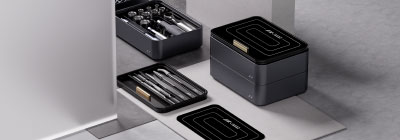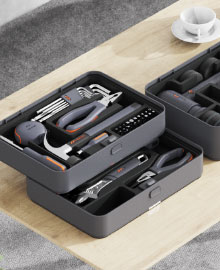
A well-prepared tool box stands as a professional's main asset for common duties like sizing wood and attaching screws with accuracy. This resource gives insight to opt for correct tools and apply them successfully.
- Start by putting together a basic kit of necessary hand tools such as hammers, drivers, wrenches, pliers, saws, and tapes.
- Gain understanding of each tool's functionality and its specific job uses.
- Practice your techniques through hands-on projects, gradually increasing the complexity.
Remember, investing time in mastering hand tools is an investment in your craftmanship. With appropriate understanding, tools serve as skill extensions enabling precise work on tough projects.
Power Up Your Projects: Exploring Power Tools
Want to boost outcomes? Enter the powerful realm of tools that combine accuracy and efficiency. These key tools can redefine project efficiency for experts and weekend builders. From all-purpose drills to specialized saws, power tools encompass a wide range for construction and repair.
- Discover the power of cordless impact drivers for easy fastening and demolition chores.
- Learn to operate reciprocating saws for swift and tidy cutting of varied materials.
- Upgrade woodworking techniques with efficient planers and jointers for refined finishing.
Utilize power tools to expedite tasks and secure standout results.
Measurement Mastery Simplified
Where accuracy is paramount, choosing ideal measuring tools has major impact. From standard scales to refined calipers, measuring instruments assist in producing precise, reliable results. Whether experienced pro or novice maker, learning these tools unlocks broader potential.
- Check out the range of measuring devices meant to address varied measurement needs.
- Learn the specific uses and benefits of each type of tool.
- Cultivate measurement proficiency and proper application methods.
Essential Kits for Every Work
Whether you're a seasoned professional or a DIY enthusiast, having the right tool set is essential for tackling any project. Whether fastening screws or building furniture, the right set enhances precision, speed and safety. Choose tool collections aligned with the tasks you will perform repeatedly.
Will a comprehensive multi-tool set be useful or is a specialized kit sufficient? With your needs defined, review brands to compare features, performance and pricing. Be sure to consult user reviews online for practical feedback prior to purchase.
With focused research and preparation you'll locate the right set to accomplish projects reliably.
Maintain Your Hand Tools for Best Results
Maintaining proper care of hand tools matters for every woodworker or DIYer. Ignoring maintenance causes blunt blades, damaged components and frustrating outcomes. Steady maintenance preserves tool quality and lengthens productive lifespan. Make cleaning tools a habit after each use to clear contaminants. Shelter tools in dry storage to minimize rust and corrosive damage.
- Maintain blade sharpness with periodic stone or file sharpening sessions.
- Apply proper lubricant to moving parts to lessen friction and extend life.
- Review handle integrity for cracks and replace damaged handles when found.

Observing these care recommendations extends tool life and results in better, more efficient work.
Key Hand Tools for Your Workshop
A complete workshop becomes an inviting workspace for enthusiasts and hobbyists. Special tools are handy yet basic hand tools form the backbone of project work. A must-have selection includes a reliable hammer, a versatile adjustable wrench, and a sturdy tape measure for accurate measurements. Also include multiple screwdriver sizes, pliers for grip tasks and a utility knife for cutting materials. A quality saw provides precise cutting and a level keeps work aligned and even.
- Crucial Hand Tools for a Personal Workshop

Power Tool Safety Demystified: Complete Resource
Power tools can be formidable instruments delivering exceptional power and efficiency. However these devices necessitate comprehensive knowledge of protective protocols. Failing to take precautions may cause severe harm. This handbook clarifies safety for power tool use and provides practices to work safely.
Kick off by learning your tools—read manuals thoroughly and absorb the specific safety features. Consistently wear suitable protective gear—safety glasses, ear protection and gloves. Inspect and service tools routinely to verify reliable operation.
Remember, safety is a priority in any workshop. Following these safety tips helps you operate power tools effectively and securely.
Picking Precision Tools for Accurate Measuring
When pursuing precise measurement outcomes, tool selection yields a major impact. A selection of measuring instruments exists, each tailored to specific purposes. Familiarity with tool qualities supports sound selection decisions. Consider elements like accuracy, resolution and scale when picking the appropriate measuring tool.
- To measure lengths precisely, use a ruler or tape measure commonly.
- To determine angles correctly, rely on a protractor.
- Analog or digital calipers suit accurate small-dimension measuring.
Selecting the correct instruments carefully provides accurate, trustworthy results.
Choosing The Ultimate Tool Set

Searching for the right tool set may be exciting and somewhat intimidating. A broad selection of choices can make selection feel daunting. This wide-ranging guide offers advice to pick the perfect tool set for your needs.
Start by reflecting on the types of tasks you will do most frequently. Are you experienced or new to the craft? Explicitly setting goals streamlines selection.
- Blend both tool types where appropriate to maximize productivity and precision Mixing hand and power tools often yields the best, most efficient outcomes Utilize both categories of tools to achieve efficient, successful project results
- Give precedence to core necessary tools
- A quality hammer, plus mallet or sledgehammer options
- An adaptable collection of screwdrivers, wrenches and pliers is crucial
- Measuring tools including tape and ruler
- Leveling instrument options: level, plumb bob, transit
Further considerations include the materials used in the construction of the tools, your budget constraints, and brand reputation. Understand that choosing sturdy tools is an investment over time.
DIY Simplified: Effective Tool Use
Embarking on your first DIY project can seem daunting. Yet with fitting tools and skillful knowledge, difficult tasks turn into wins. Kick off by understanding and becoming acquainted with your tools. Peruse manuals thoroughly and practice techniques in a safe space. Keep in mind safety is always your primary concern. Wear suitable PPE including goggles, gloves and earplugs to shield yourself.
Choosing tools, pay attention to durability and structural sturdiness. Invest in reliable dependable trustworthy brands that will stand the test of time last for years serve you well.
Seek advice from experienced DIYers or store professionals when unsure. Store pros and experienced DIYers can share practical suggestions and insights for picking ideal tools.
- A maintained sharp edge equals safer tool use—keep blades honed.
- Store tools correctly to maintain condition and prevent loss.
- Venture into new projects to broaden DIY experience and skills
Choosing Power or Hand Tools: A Practical Guide
Doing repairs or builds? Selecting power or hand tools may present a tricky choice. While powerful power tools maximize speed and output, classic hand tools are indispensable for precise and minor work. Here's a breakdown guide to help you select choose pick the right option tool equipment for the job.
- For detailed, precise work—carving, fitting, intricate fixes—hand tools are ideal. These tools offer heightened control and usually come at a lower cost.
- Power tools are preferable for swift, efficient actions like cutting, drilling, and large-scale sanding. They can significantly dramatically substantially reduce time effort labor.
Ultimately In the end Finally, the best optimal preferred tool depends on the specific project task job at hand, your skill level experience expertise, and your budget. Mixing hand and power tools often yields the best, most efficient outcomes.
